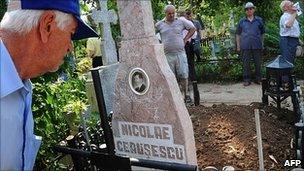DNA check on remains from grave of Romania's Ceausescu
- Published

Some Romanians gathered at the grave after the remains were exhumed
Scientists in Romania have exhumed what are thought to be the remains of former dictator Nicolae Ceausescu and his wife in order to check their identity.
The exhumation follows a request from Ceausescu's family, who have questioned whether the couple were really buried in the Ghencea cemetery in Bucharest.
Nicolae Ceausescu ruled Romania from 1965 until he was toppled in the 1989 revolution.
He was caught and executed with his wife after the couple tried to flee.
It is believed the bodies were hastily buried in an unmarked grave in the military cemetery.
But the whereabouts of the corpses has been described as one of the great unsolved mysteries of the Romanian revolution, the BBC's Oana Lungescu reports.
'Black winter coat'
The couple's only surviving son, Valentin, and their late daughter's husband have said they want the identity of the bodies verified.
On Wednesday pathologists and cemetery officials oversaw the exhumation, taking samples in plastic bags for DNA testing.
Son-in-law Mircea Oprean was quoted as saying that he thought the remains were probably those of the Ceausescus, though he could not be sure until the tests were done.
"I saw the bodies, my father-in-law's was quite well preserved, I recognized his black winter coat with some holes in it," he said, according to the AFP news agency.
Gelu Voican-Voiculesc, a former official from the government that took power after Ceausescu's fall, supervised the burial in 1989 and said the tests would prove that he had always been right.
"The Ceausescus' remains will definitely be found in those tombs," he said.
"I hope those who have harassed me for years with all sorts of accusations will now apologise."
The DNA tests could take up to six months, according to Romanian media reports.
"I hope that the DNA is not altered by water, fertilisers or acidic substances, because, if this is the case, it will be very difficult to obtain a very precise result," Dan Dermengiu, the head of Romania's national institute of legal medicine, told Realitatea TV.